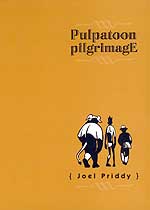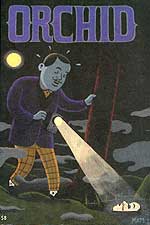 SPX 2002 Anthology
SPX 2002 Anthology |
Founded in 1994, SPX has the unique mission of promoting comix as an artform rather than a childish collectible commodity. Most comic conventions consist of comic shop retailers and sleazy private collectors selling over-priced books to pre-teens and lonely bachelors. But the exhibitors at SPX have been deliberately limited to publishers and creators. By focusing on the small press, SPX excludes the superhero drek which makes up at least two-thirds of the comicbook market. SPX has become the convention where North America's best comic publishers come out from the shadows. "For me as both a publisher and as a fan, [SPX] is my most important show of the year..." Jeff Mason, publisher of Alternative Comics wrote in an email. "It is by far the best place to discover new talent and new projects." Tom Devlin, publisher of Highwater Books, describes SPX as being "everything" to him. "[Y]ou sell a lot of books and you see all your pals. What could be better?"
 Joel Priddy's "Pulpatoon Pilgrimage"
Joel Priddy's "Pulpatoon Pilgrimage" |
With over 300 cartoonists and 1600 attendees, this past SPX was the biggest yet. Filling a giant banquet hall and two large rooms besides, it took two solid days just make sure you didn't miss anything. Not only could you find new books from such publishers as Fantagraphics, Drawn & Quarterly and Top Shelf, but also such impossible-to-find-elsewhere stuff as Jason Shiga's self-published "choose-your-own-adventure" book "Meanwhile..." Other must-haves included Joel Priddy's charming "Pulpatoon Pilgrimage," a digest-sized book about a minatour, a plant-man and robot, which took home a prize for "Outstanding Debut" at the show. Many interesting anthologies could likewise be found. "Orchid" collects Victorian short story adaptations. Another outstanding anthology, "SPX 2002," appeared in conjunction with the convention. This extremely entertaining book has many of alty comix' best artists creating biographies of everyone from St. Francis of Assisi to Terry Sawchuck, hockey's greatest goalie.
For the last five years SPX has partnered with the International Comic Arts Festival, an academic-style conference. This year's ICAF presentations included a forum on Finnish comics, and interviews with Jason, author of "Hey, Wait..." (see TIME.comix review), and the Hernandez Brothers, creators of "Love and Rockets" (see TIME's 21st Century Innovators). Art Spiegelman, author of "Maus" and creator of many memorable "New Yorker" covers, drew the biggest crowd. Virtually paralyzed by the success of his Pulitzer Prize-winning book, the mortifying shock of witnessing the twin towers collapse on September 11th has made him "want to do comics again," he says. But it was Eddie Campbell, the Scottish author of such books as "How to Be an Artist," (see TIME.comix review) who gave one of the most erudite and interesting of presentations. Like one of his books, Campbell meandered from personal confession ("I'm becoming very morbid of late.") to comix theory ("The [comix] page is about time but is also like a map. Location on the page is important.")
 Jason Shiga's "Meanwhile..."
Jason Shiga's "Meanwhile..." |
But was this the last "good" SPX? The convention will move to Baltimore next year, appearing simultaneously with the mainstream-oriented Baltimore Comic-Con. "We've outgrown Bethesda," Greg McElhatton, Executive Director of SPX, wrote in an email exchange. "Our plan for 2003 is for the Baltimore Comic-Con and SPX to each have their own halls in the Baltimore Convention Center. One admission gets you into both shows, but if you only want to see Top Shelf and Fantagraphics and Drawn & Quarterly, you can stay in SPX 2003 the entire time and never leave." In the best-case scenario SPX will be able to accommodate a greater number of interesting artists and allow for cross-pollination between the mainstream and aesthete audience. "Our partnership with the Baltimore Comic-Con was not chosen lightly, and would not have been an option if we did not feel we could keep the same 'feel' to SPX for 2003 and beyond," McElhatton wrote.
 "Orchid," comix version of Victoriana
"Orchid," comix version of Victoriana |
Reactions to the move are mixed. Eric Reynolds, a cartoonist and member of SPX's steering committee, is "adamantly opposed" to the move. "SPX has essentially one particular thing going for it — that it's not a comic book convention," Reynolds wrote to me, "... the spirit of the show and the ideals behind it have been compromised for logistical advantages." Reynolds notes the loss of ICAF, who have decided not to follow SPX to Baltimore, as an example of the ramifications. Tom Devlin, another member of the SPX Steering Committee, likewise has concerns. "Basically, I think the low brow aspect of the typical comic convention will drive the high brows away," Devlin wrote me. Others, like Chris Staros, publisher of Top Shelf Comics, support the move. "The idea of running both shows simultaneously and side by side may prove to be an incredible crossover event," Staros wrote me.
Creators, publishers and fans anxiously await this new stage in the evolution of SPX, America's "weirdest," best comicbook gathering. One thing seems likely, though. This will have been the last year where the only costumes you see are one guy wearing a straw boater and a middle-aged drag queen dressed as a cheerleader in cowboy boots.
With the exception of Jason Shiga's "Meanwhile..." all books mentioned herein should be available at superior comic stores. SPX 2003 will take place in Baltimore on October 24-26.
